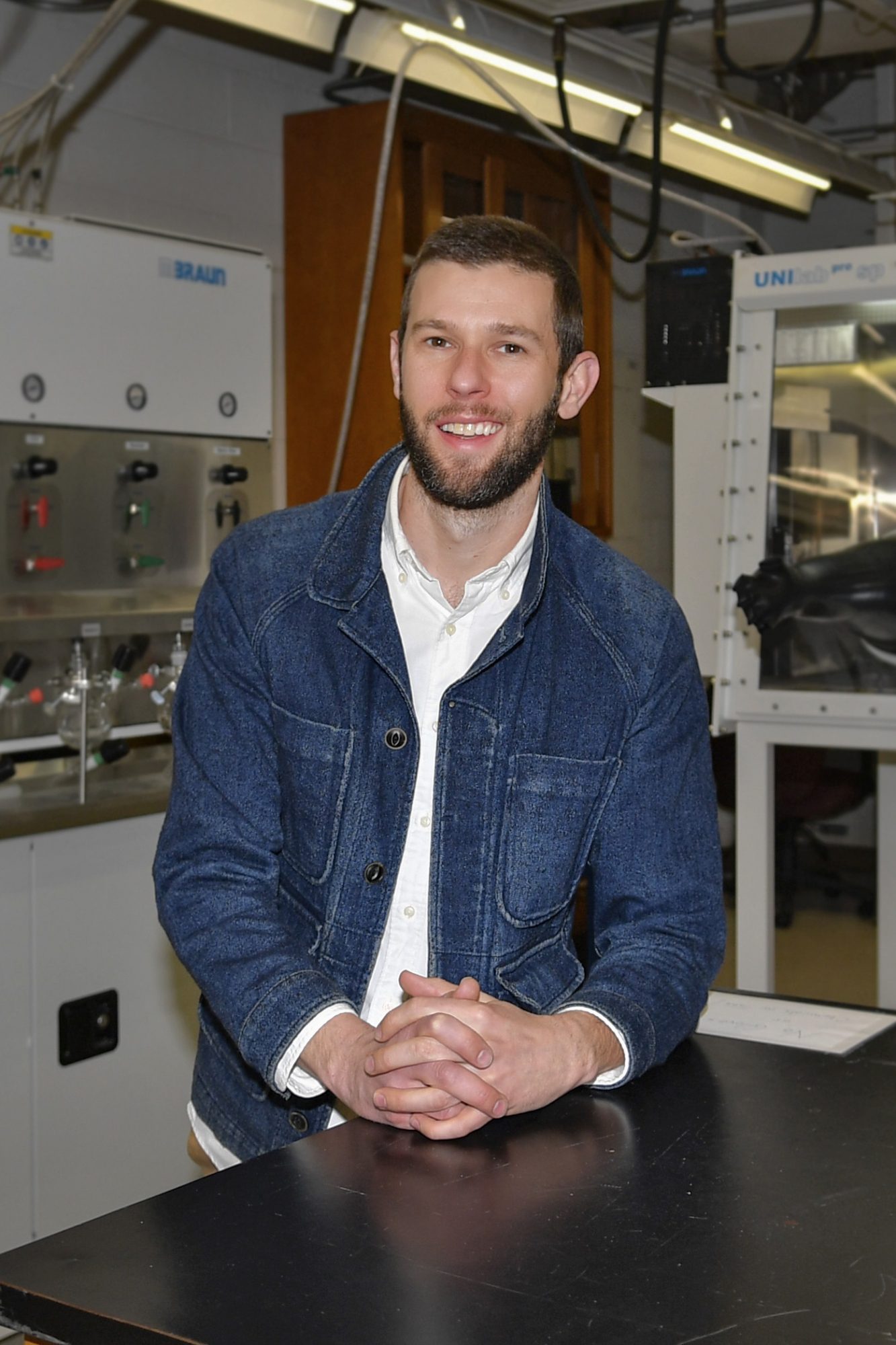Building a Nucleus: Early-career researchers help drive UNC Charlotte’s reputation
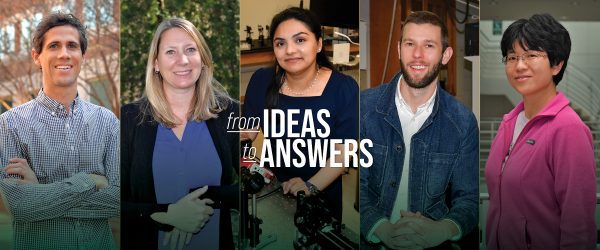
Attracting and supporting top-notch researchers are UNC Charlotte academic hallmarks. Highly talented and enthusiastic, new faculty members arrive at North Carolina’s urban research university eager to make an impact in their research as well as in their classrooms and on the community.
This reputational touchpoint is validated by the fact that many are emerging as ‘rock stars’ in their disciplines. Over the past two years, five relative UNC Charlotte newcomers joined the ranks of the National Science Foundation’s Faculty Early Career Development (CAREER) Award recipients, an honor considered among the most coveted by researchers nationwide.
“NSF CAREER Awards are among the most prestigious national awards in support of early-career faculty and recognize individuals who exemplify and embody the role of teacher-scholars, integrating research and education to advance the missions of their departments and universities,” said Rick Tankersley, vice chancellor for Research & Economic Development. “These faculty members are conducting pioneering research to understand and solve problems that address some of society’s greatest challenges, providing valuable educational experiences for their students — tomorrow’s leaders — and connecting with communities that are realizing the impact of UNC Charlotte on our region.”
Given to those who demonstrate the capacity to “build a firm foundation for a lifetime of leadership” through their work, CAREER Awards affirm for the recipients — and signal to the research community — that they are making a noticeable and lasting difference at their institutions and in their fields.
CHRISTOPHER BEJGER, CHEMISTRY
NSF CAREER Project: “Transition Metal Chalcogenide Clusters: Preformed Building Blocks for Framework Materials”
$624,000 through 2026
Chemistry Assistant Professor Christopher Bejger leads a UNC Charlotte research team that is focused on the design, synthesis and assembly of molecular clusters for energy applications; he describes the team’s work as “constructing multidimensional materials using nanoscale building blocks.” Specifically, they are studying crystalline porous frameworks and redox flow batteries prepared from hybrid organic-inorganic clusters and small molecules.
For the outreach portion of Bejger’s project, he is partnering with Rachel Dickey from UNC Charlotte’s College of Arts + Architecture to fabricate a pop-up museum to “take chemistry and nanoscale science out of the laboratory and into the community” with an aim to “improve public perception of the chemical sciences.” They also anticipate working with the Charlotte Teachers Institute to present a seminar series for Charlotte-Mecklenburg Schools teachers and host both science and art educators in a summer research experience for teachers.
“This award provides a stable source of funding to support students, which helps grow our laboratory and graduate program,” Bejger said. “The CAREER award is unique in that it encourages you to approach education and outreach in a novel manner. This is fun and exciting because the chemistry that takes place in our lab is a form of miniaturized architecture.”
What motivates you to do this research?
Bejger: “A fundamental curiosity drives us to make new materials. We are also motivated by the electronic applications of these materials and our ability to tailor their properties by making small structural changes.”
In what ways do you collaborate with other researchers, either in your discipline or another?
Bejger: “Collaboration is vital to our research, and this grant provides a way to collaborate outside our discipline. We get to address the disciplinary gap between chemistry and architecture by exploring overlapping innovative processes that pertain to scale and the manipulation of matter. Chemistry and nanoscale science students will interact and collaborate with architecture students to discuss these connections.”
Read more: Chemist conducts innovative energy research
Colleen Hammelman, Geography and Earth Sciences
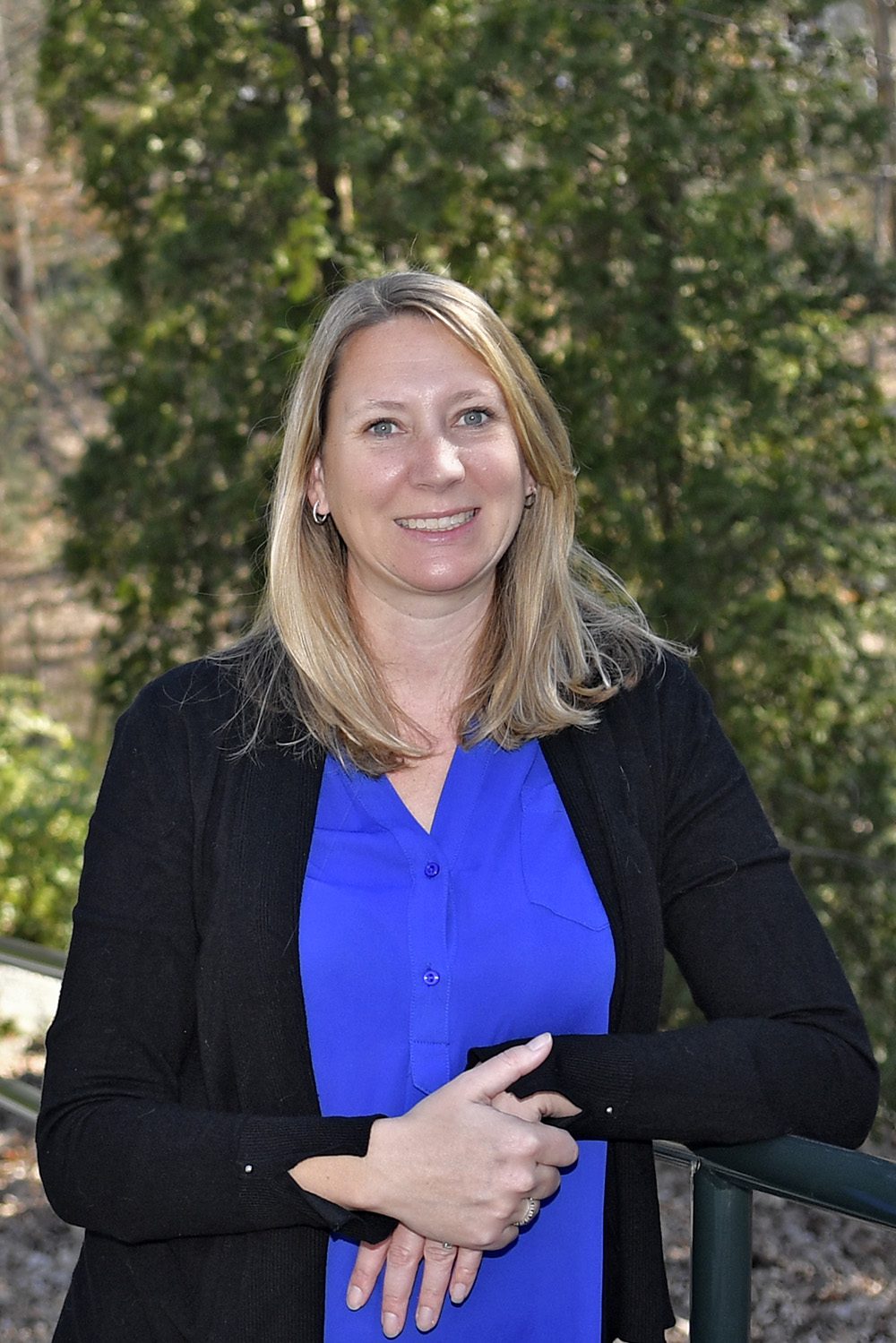 NSF CAREER Project: “Population Change and Gentrification in Urban Foodscapes”
NSF CAREER Project: “Population Change and Gentrification in Urban Foodscapes”
$461,000 through 2025
Colleen Hammelman, an assistant professor in the Department of Geography and Earth Sciences, possesses a deep expertise in social justice in urban food systems across the Americas that leads her toward finding solutions to specific problems faced in many cities.
Systematically investigating the ways migrants’ food landscapes scapes are changing as a result of urban restructuring in Atlanta, Charlotte and Washington D.C., Hammelman is addressing where in the cities migrants are constructing new foodscapes and the implications of foodscape relocation for migrant economic outcomes, social service provision and neighborhood integration. Her work also considers how migrant placemaking practice has been differentially impacted by the COVID-19 pandemic.
“Charlotte is an incredibly relevant place to study and teach about urban geography,” Hammelman said. “From its history as a trading post to becoming today’s banking center, but also the vibrant history of African-American neighborhoods and the growing influence of migrant communities, it offers a first-hand opportunity to understand urban processes.”
What about urban foodscapes interests you?
Hammelman: “I first began working on issues of social justice in food systems in response to the World Food Crisis in 2008 and 2009, during which urban residents, in particular, were unable to purchase food staples because of the global economic crisis and a rapid increase in oil and food prices. Protests worldwide made visible the dysfunction in global political economic systems that produce hunger.”
How does your research affect your teaching? What do your students bring to the research process?
Hammelman: “I explore topics and theories in the classroom that have relevance to my research and I bring my research projects directly into the classroom via experiential projects for students. Most recently — and with the support of this grant — I developed a writing-intensive course, “Food, Migration, & Place,” through which students will engage with literature on these topics, build technical writing skills by creating StoryMaps about migrant food artifacts, and learn to understand landscape change through participating in field surveys. The StoryMaps and field surveys bring students directly into the data collection process for this research project, while also building technical skills to prepare them for their future careers.”
Read more: Hammelman to study urban foodscapes with NSF award
Xingjie (Helen) Li, Mathematics and Statistics
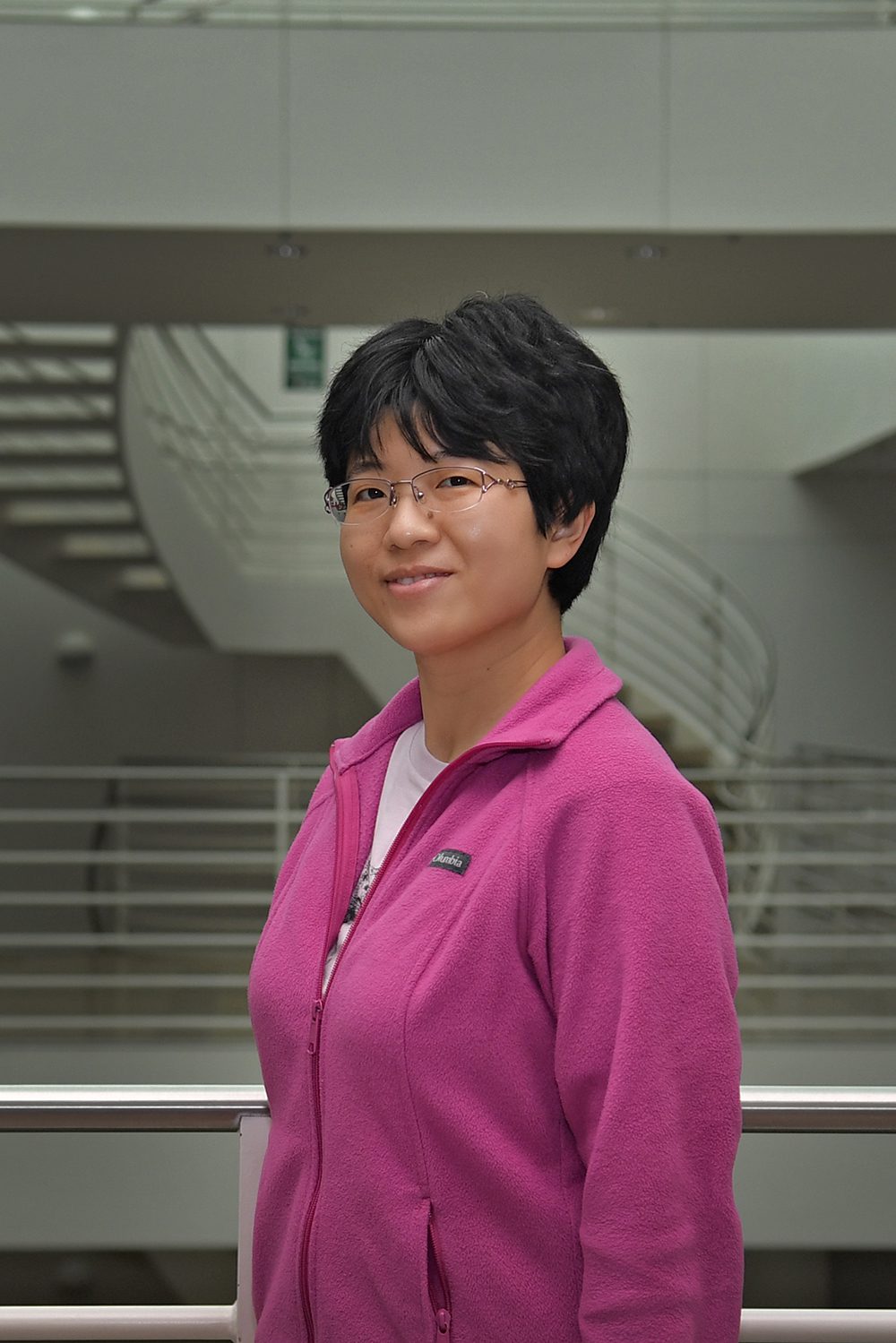 NSF CAREER Project: “Multiscale Framework for Crystalline Defects in Two-Dimensional Materials”
NSF CAREER Project: “Multiscale Framework for Crystalline Defects in Two-Dimensional Materials”
$400,000 through 2024
Xingjie (Helen) Li , associate professor in the Department of Mathematics and Statistics, describes her research in a lyrical way. She often compares solving an intricate mathematics problem to a poem, with its economy, precision and ability to share joy.
“With a poem, you often just use a few words to describe something,” Li said. “And in mathematics, we also use a few expressions to describe a problem. It’s complicated stuff, but you know there is a unique path to this complex thing. And through the truth of mathematics, you can identify this unique path.”
For her NSF-supported project, Li is focused on the development of a new and quantitative coupling framework for defective 2D systems. The work provides a research and outreach platform to prepare and train students for interdisciplinary research and disseminate knowledge on a range of educational levels from K-12 students to young postgraduate researchers and the general public.
What does receiving an NSF CAREER Award mean to you and for your work? What are you able to do that previously wasn’t possible?
Li: “The funding makes it possible to support my students fully committed to research during the academic year. Both the students and I can attend more conferences to disseminate results to the research community and uphold the University’s research reputation. In addition, I can do community outreach to promote STEM education for K-12 students.”
What outcomes do you expect to achieve after this five-year grant?
Li: “Besides publication and student mentoring, I would like to build a regional or national supported center of applied mathematics at UNC Charlotte.”
Read more: Mathematician finds beauty in her work
Kevin McGoff, Mathematics and Statistics
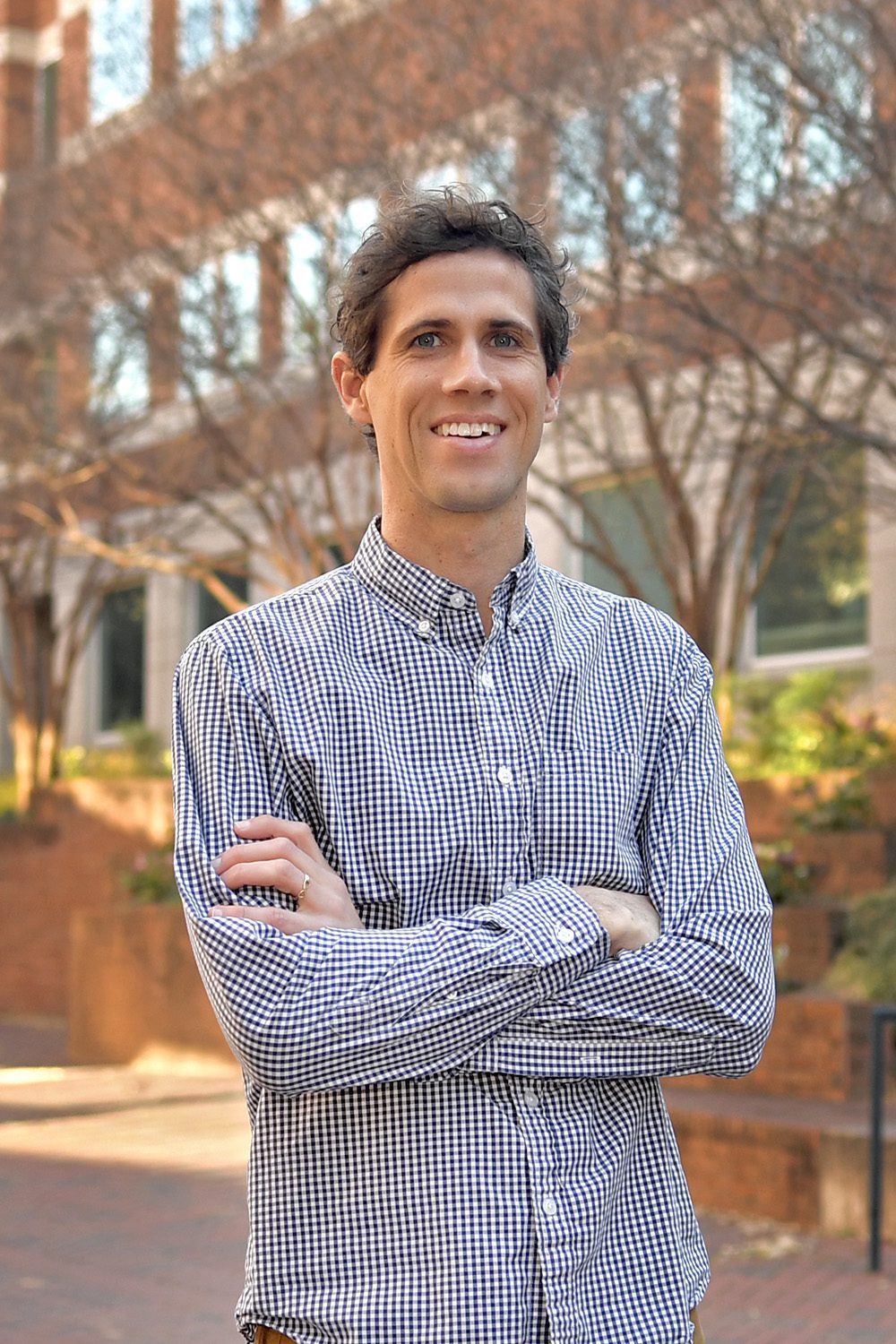 NSF CAREER Project: “Stochastic Forward and Inverse Problems Involving Dynamical Systems”
NSF CAREER Project: “Stochastic Forward and Inverse Problems Involving Dynamical Systems”
$419,367 through 2024
Associate Professor of Mathematics Kevin McGoff analyzes dynamical systems, specifically addressing the interrelated questions about their behavior and what can be learned from observations of a dynamical system or group action. He anticipates that the theoretical tools produced by this research may be of broad use in informing inference methodology in fields such as geometric morphometrics, shape analysis and systems biology, and could advance understanding of important biological processes.
McGoff’s NSF CAREER project is expected to contribute to the education of students from middle school to university graduate level, in its engagement component. In particular, he looks forward to working with students from the UNC Charlotte Pre-College STEM Program.
“Within the mathematical field of dynamical systems, I hope that my research will contribute to our understanding of typical behavior for chaotic systems,” said McGoff. “At the same time, I really enjoy doing research with students. They bring energy, new ideas and fresh perspectives to the process. Not only do they make research more productive, but they also make it more fun.”
What do you find fascinating about your field?
McGoff: “Since I learned about the mathematical study of dynamical systems as an undergraduate, I have found it very interesting that we can describe the behavior of very complex systems using the tools of mathematics.”
How does collaborating with others affect your work and its outcomes?
McGoff: “I’ve had the chance to work with some outstanding researchers, and I am very grateful for that opportunity. In my collaborative research, many of the core ideas have arisen in the course of conversations and discussions. In my applied collaborations in particular, I simply could not conduct that research without the patience, understanding and domain expertise of my collaborators.”
Read more: McGoff studies dynamic systems to find practical solutions
Rosario Porras-Aguilar, Physics and Optical Science
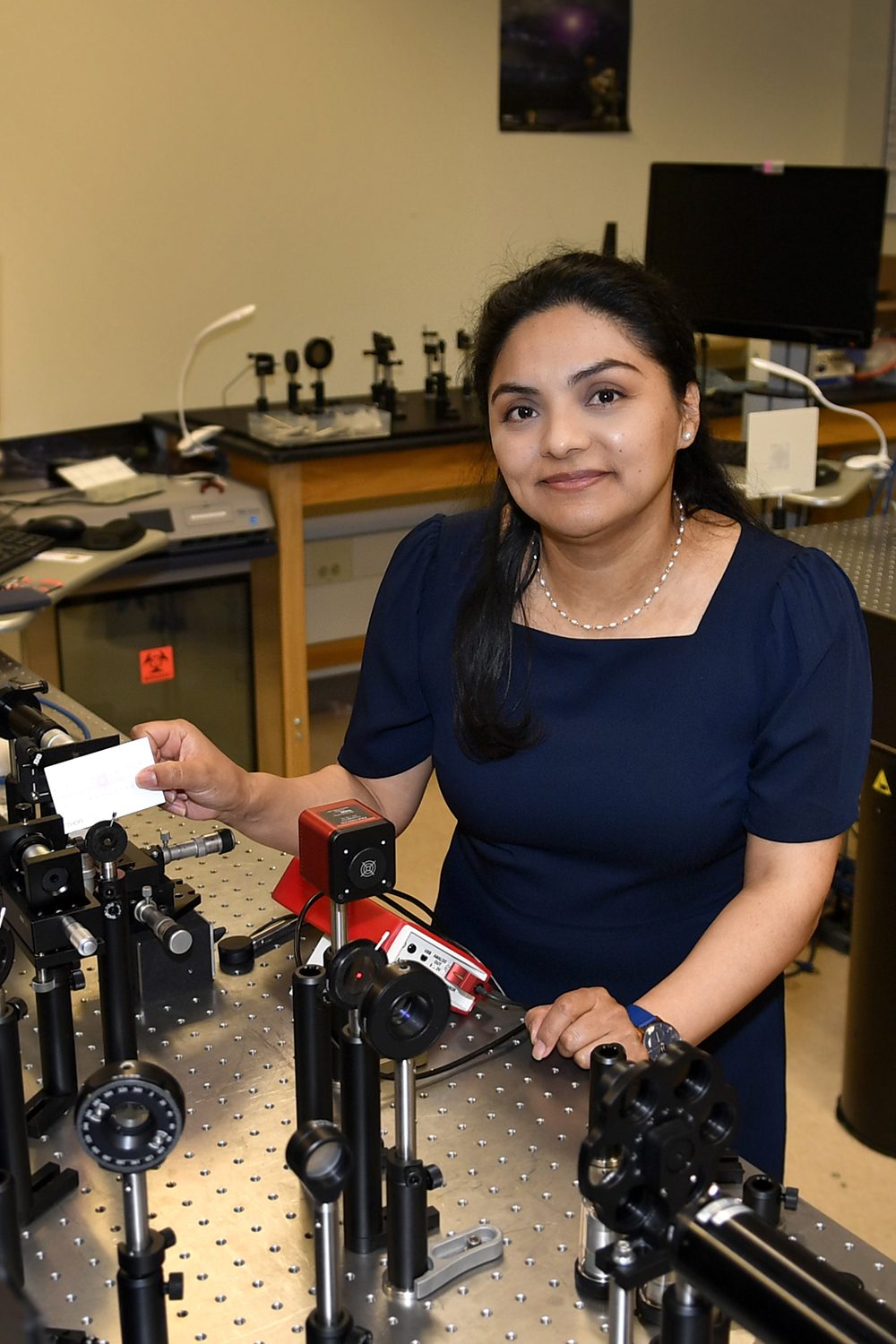 NSF CAREER Project: “Smart Imaging and Metrology Enabled by Liquid Crystals”
NSF CAREER Project: “Smart Imaging and Metrology Enabled by Liquid Crystals”
$500,000 through 2026
Rosario Porras-Aguilar, an assistant professor in the Department of Physics and Optical Science, is the principal investigator of the Active and Reconfigurable Optics Laboratory. Her research focuses on developing microscopy techniques to obtain quantitative data in three dimensions, with applications in microbiology and industry.
Porras-Aguilar was recently recognized as Cottrell Scholar in physics for her research in “Label-Free Reconfigurable Microscopy with High Specificity.” Porras-Aguilar also is co-principal investigator for several research projects through the Center for Freeform Optics and the Center for Precision Metrology.
“I have always been fascinated with light, starting from the stars to the precious patterns observed when light passes through a thick and transparent glass,” said Porras-Aguilar. “Professionally, my interest in optics began during my master’s in astronomy studies when I learned about telescopes that can compensate for the deformation in images induced by changes in the atmosphere.
“My ambition is to develop imaging systems that modify themselves to visualize or detect a particular content of interest,” she continued. “The human eye is a perfect example of such a system. It uses a single lens and iris to adjust, almost instantaneously, to visualize objects in various illumination levels and at distances ranging from a few centimeters to hundreds of meters.”
What do you bring from the lab into your classroom? In other words, how does your research affect your teaching?
Porras-Aguilar: “I am convinced that learning-by-doing is an effective way to understand and retain knowledge. For this reason, my approach to teaching incorporates hands-on experiences in the laboratory combined with computational simulations in optics and photonics. In theoretical classes, I incorporate research projects focused on the research question rather than on the topic to stimulate students’ curiosity and critical thinking.”
In what ways does UNC Charlotte support your research so that your process is successful?
Porras-Aguilar: “Isaac Newton said, ‘If I have seen further, it is by standing on the shoulders of giants.’ At this university, I have found many of those giants for my career. I have been very fortunate to have mentors with no precedent in my professional life. Starting from the Department of Physics and Optical Sciences, my chairman and professor Glenn Boreman and more recently, professor Mike Fiddy. They are an inspiration and a role model for the scientific community and me.”
Read more: Researcher earns NSF Career Award to support work with optical systems
